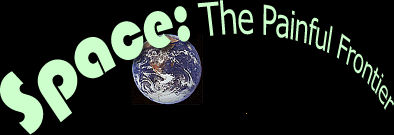
Part Four - Alaska Prepares Space Doc for "Ultimate House Call"
A crew to Mars would almost certainly have a physician. Of course, that physician could be the one who gets sick. On Earth, a team of other medical experts will be on hand to offer advice. But the farther one gets from Earth, the more of a delay there will be in transmissions to and from the ship; whoever is providing medical care will have to weigh the need to stabilize and treat, in between getting advice from home.
On his Space Shuttle flight in 1998, Anderson was part of a telemedicine experiment that sent all of his body signals to Earth. The equipment was so portable that it could fit into your carry-on airplane luggage, he says.
"I had every test you would get at a standard trip to the doctor's office," he says.
When Cagle was at the UW School of Medicine, she participated in a program that sends doctors to the farthest corners of the Northwest. She delivered babies in the remotest corners of Alaska. She refers to a trip in space as the "ultimate house call" and says practice on Earth is great training in developing the judgment physicians will need: "You can't get much more remote than space."
It's this combination of earthly experience and high-tech experimentation that has people confident that we will go to Mars and beyond. "We'll solve this question, just as we solved the problem of getting into orbit. People forget how far we have come," Dunbar says. "When I was growing up, people seriously thought that the body could not function in zero gravity. When I was in high school in Eastern Washington, our physics textbooks still said that the human body could not hold together at the speed of sound."
In space, Dunbar helped examine Russian astronauts on the Mir and noted how well they had adapted to the gravity-less environment. She herself has found readjusting to zero gravity is easier each of the five times she has been in orbit, for a total of 51 days.
"It probably takes two days for the average person to get adjusted. Then it takes less time with each flight. It's a lot like playing sports—at first, you have to think about what you are doing, and then, after practice, you just reach out and catch the ball," Dunbar says.
So while the zero gravity confuses the body, the body adapts. Kushmerick says that the study of space medicine is an exploration into yet another amazing aspect of this most amazing of all machines: "Humans have evolved for hundreds of thousands of years. There has been life for billions of years, and no one has been exposed to zero g. Never.
"And yet we respond in an appropriate way. How come our systems are smart enough to do that? This is the central scientific fascination of space medicine." —Walter Neary is a media relations officer for the UW Office of Health Sciences and Medical Affairs News and Community Relations and a former business and technology editor for the Olympian.
Go To: Page 1 | Page 2 | Page 3 | Page 4
- Sidebar: From Fiction to Fact: Space Station Alpha
- Return to March 2001 Table of Contents